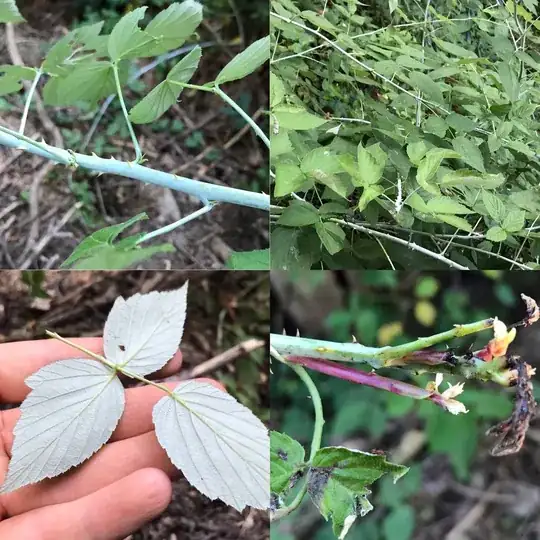I am located in Southwestern Pennsylvania and I know wild black raspberries are native to me and the surrounding counties. The plants are randomly growing in patches throughout the woods on my property which tells me they were spread by bird droppings. Primocanes reach about 8ft long and the floricanes are a deep purple color. Floricanes are not pictured. The canes are a bluish white (glaucous) color, the cane is smooth/round and not angled/squared like some wild blackberries, whitish underside of the leaves, and tip rooting. These are all common black raspberry traits. However, I have never seen the canes flower/fruit. This makes me wonder how they spread so randomly if it was from bird droppings. No fruits = no bird droppings. I am uncertain that these are black raspberries (Rubus occidentalis). Is there such a thing as a non fruiting rubus-looking plant? If they are black raspberries, they must be a late bearing variety.

- 331
- 1
- 7
3 Answers
You mentioned they are growing in the woods, which means they are in at least partial shade. Raspberries (like many fruit-bearing plants) will only produce fruit if they have adequate sunlight. It's quite common to see wild-growing raspberry patches that don't fruit, because they don't get enough sunlight.
Somewhere else, there is a patch of raspberries growing in the sun. Those plants make fruit, birds eat the fruit, and deposit their seeds in many places. Some of the places where the seeds are deposited, have enough sunlight for the seeds to grow into healthy plants, but not enough sunlight for those plants to make fruit.
It's also possible that the patches are not bearing fruit because (as blacksmith37 mentioned) they are diseased. A disease can cause a plant enough stress to prevent it from fruiting.
To summarize: it's not a non-fruiting variety of raspberries. It's simply a patch that doesn't have enough energy resources to produce fruit this year.
- 2,280
- 4
- 12
-
The photos I was able to gather are from the patch with the most sunlight. Other patches are in the shade from the dense woods. I am going to try an experiment and transplant some of the healthiest canes I can find. I will place them in some good soil and provide ample sunlight. Black raspberries are at the top of my berry list in terms of flavor (even ranking higher than Cloudberries). Maybe I might be able to harvest some black raspberries next year. – giuseppe Aug 01 '20 at 04:07
-
I strongly recommend doing some research into the kinds of diseases raspberries can get. I've heard of people having to destroy entire raspberry patches because of disease (some kind of rust fungus in that case, if I recall correctly). Even apparently healthy canes had to be destroyed in order to eradicate the disease. – csk Aug 01 '20 at 04:12
-
Also, I totally agree with you. Black raspberries are the best. It's always disappointing when the wild black raspberries start to go out of season, and the wild blackberries come into season. Wild blackberries are just not as good. But have you ever had [wineberries](https://en.wikipedia.org/wiki/Rubus_phoenicolasius)? They're almost as good as black raspberries. They're invasive so you shouldn't plant them, but by the same token you can feel virtuous when picking them in the wild. Every berry you eat is one less that will be planted elsewhere by birds. – csk Aug 01 '20 at 04:15
-
Yes I prefer black raspberries over blackberries. I am eager to try the purple raspberries and Tayberries that I planted this year. I have at least 100 wild Wineberry plants on my property. The taste is good but not the best in my opinion. The birds love them and it seems like the Wineberry seeds sprout very easily based on the random Wineberry plants popping up everywhere. – giuseppe Aug 03 '20 at 13:34
The photo of the vine tips seems to show some are dying. This is typical of black raspberries, they are highly subject to anthracnose mold. The main task when growing black raspberries is removing any diseased parts to slow the spread. It can prevent fruiting if severe. They mostly spread by new canes touching the ground and rooting
- 8,496
- 1
- 9
- 15